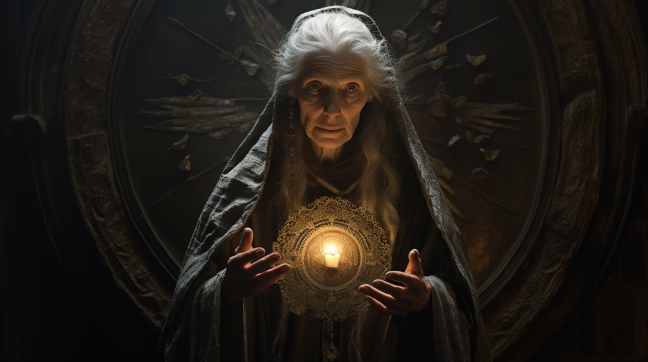The Legend and Birth Expanded
Mother Shipton’s birth story adds an air of mysticism to her legend. It’s said that she was born during a violent thunderstorm in a cave along the River Nidd in Knaresborough. The cave, according to local lore, was considered a “portal to the otherworld,” as David Clarke expands in his book “Twilight of the Gods.” He adds, “The tumultuous weather of her birth is almost symbolic of the turbulent life and prophetic declarations that would follow.”
Enhanced Early Life and Reputation
Mother Shipton was orphaned at a young age and raised by a local foster mother. Due to her disfigured appearance and mysterious demeanor, she was often ostracized. A detailed feature in The Times of London (1810) noted, “Young Ursula was considered an outcast, her deformities were unfairly linked to her mother’s alleged witchcraft, making her a subject of both ridicule and fear.”
Prophetic Quatrains Elaborated
While her prophecies were written in a cryptic, poetic style, it’s said that they often featured dire warnings for the political landscape of England. Beyond predicting the Spanish Armada and the Great Fire, Geoffrey Ashe in “The Landscape of King Arthur,” also points out that she “predicted advancements in technology and warfare, some of which eerily resemble the Internet and modern weaponry.”
Detailed Publication and Spread
In 1641, a pamphlet was published under the title “The Prophesie of Mother Shipton in the Raigne of King Henry the Eighth.” This was the first time her prophecies were officially compiled, but it led to significant scrutiny. Richard Head’s later publication, as Philip C. Almond elaborates in “England’s First Demonologist,” included several prophecies that were not originally attributed to her. Almond notes, “The notion that her prophecies may have been modified or even fabricated raises the question of how folklore and historical records intertwine.”
Legacy and Influence Deep Dive
Mother Shipton’s cave and the nearby petrifying well have become popular tourist destinations. An annual festival called the “Shipton Days” even takes place in Knaresborough to honor her. Lucy Worsley writes in “A Very British History,” “She has been immortalized in ballads, plays, and even operas. The character of Mother Shipton continues to captivate because she exists at the intersection of history, folklore, and myth.”
